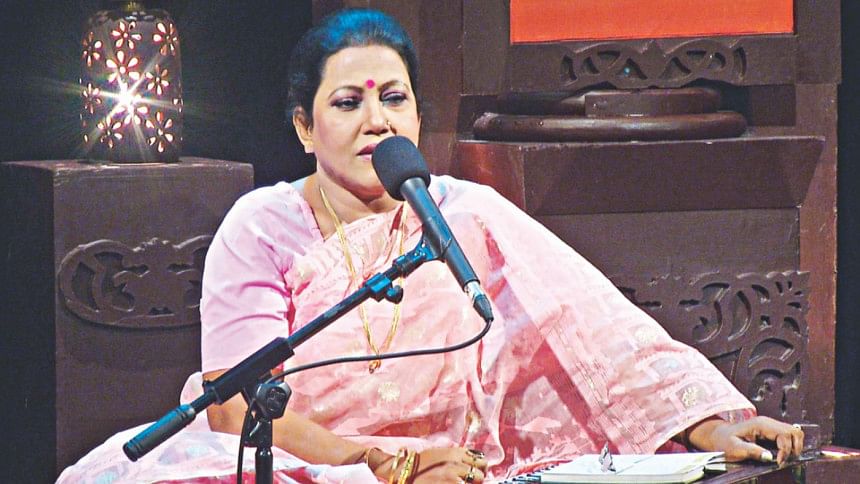“We are doing injustice to traditional folk music”

Through decades of her dominant presence in the Bangla folk music arena, Farida Parveen has become synonymous with Lalon songs. Having released albums such as “Khachar Bhitor Ochin Pakhi”, “Milon Hobe Koto Din-e”, “Nindar KaNta”, “Pap Punner Kotha”, “Shomoy Gele Shadhon Hobena” “Kishori Bou”, and “Tomra Bhule Gecho”, she has achieved prestigious awards such as the Ekushey Padak (1987), Bangladesh National Film Award for Best Female Playback Singer (1993) and Fukuoka Asian Culture Prize (2008).The Daily Star( TDS) had a conversation with the legendary singer recently.
TDS: How were you attracted to music?
Farida Parveen: It goes back to my childhood. I was born in Natore and my father's transferable job took us to many districts. During our stay in Magura, while I was just five, one night I left the house stealthily just to listen to a harmonium being played at a neighbour's house. That night I got a severe scolding from my mother who found me after a long search. Sensing my fascination for music, my father got a harmonium made at home and made arrangements for a music teacher for me, while I was too little to get familiar with the harmonium. I learned Nazrul Sangeet and classical music in my childhood. I started my music career in Rajshahi Betar.
TDS: We know you specialised in Lalon songs. How did the transition from Nazrul Sangeet to Lalon happen?
Farida Parveen: During the Liberation War I had to stop singing due to an itinerant life in rural areas of Magura. Immediately after the victory, during our stay in Kushtia, I came in contact with noted Lalon singer Moksed Ali Shai, who became my guru and inspired me to learn Lalon songs. At a Dol Purnima programme at Lalon's shrine in Kushtia, I sang my first Lalon song “Satya Bol Supothe Chol Ore Amar Mon”, which drew huge attention inspiring me to learn and perform more Lalon songs.
TDS: You have done a few modern songs too.
Farida Parveen: Most of my popular numbers were produced in Bangladesh Betar (then Radio Bangladesh), for which I am grateful to the institution. Rejected by the selection board of Dhaka Radio the song “Ei Padma, Ei Meghna” was recorded at Rajshahi Radio. Later in a BTV programme in 1973, I performed the song again and it was a big hit. Other popular numbers “Tomra Bhulei Gechho Mollikadir Nam” and “Nindar Kata Jodi Na Bidhilo Paye” were first recorded in Khulna Betar. These were creations of noted lyricist Abu Jafar.
TDS: What do you feel about the present scene of folk music?
Farida Parveen: We are doing injustice to our traditional folk music in the name of fusion, and unfortunately, a portion of the media is promoting that for commercial reasons. Fortunately a few torch-bearers of folk music are still around to enlighten the public at large.
How do you think we should go ahead with our folk music?
Farida Parveen: We should involve the folk music experts to nurture the folk tradition. The media has a crucial role to play by promoting the authentic folk tradition. We should focus on the creations of bards such as Radha Raman, Jalal Khan and many others. There is no harm in modern music accompaniment but not at the cost of the real spirit of the songs. The government could establish cultural institutions that will cultivate the real essence of the folk tradition.
TDS: What keeps you busy these days?
Farida Parveen: At the Farida Parveen Foundation that I established, I am grooming children in folk music. They practice singing folk songs and playing folk instruments such as the banshi, the dotora, the dhol, the tabla etc. I wish I could establish an archive to preserve our folk resources that are in threat of distortion and extinction. I need government support to materialise my dream.
TDS: Any words of advice for the new generation of singers?
Farida Parveen: A few words. Don't sing only for monetary returns, rather be committed to quality. Money and fame will follow automatically.
The writer is a contributor to The Daily Star.

 For all latest news, follow The Daily Star's Google News channel.
For all latest news, follow The Daily Star's Google News channel. 



Comments